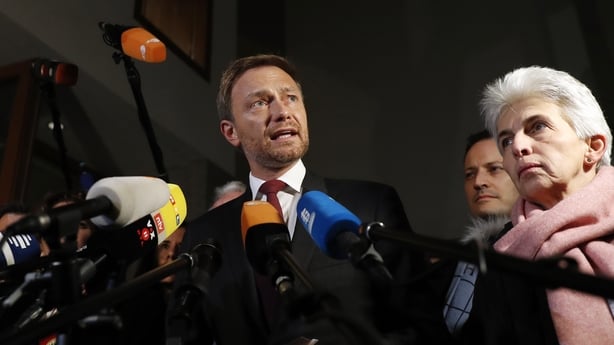German Chancellor Angela Merkel has said that she was ready to lead her party into snap elections, rather than risk leading an unstable minority government, after the collapse of coalition talks plunged Germany into a political crisis.
"I'm very sceptical" about a minority government, Ms Merkel told public broadcaster ARD, adding that "new elections would be the better path".
The pro-business Free Democrats (FDP) unexpectedly pulled out of more than four weeks of negotiations with Ms Merkel's conservative group and the Greens, citing irreconcilable differences.
The euro hit a two-month low against the yen soon after FDP leader Christian Lindner said yesterday that his party was withdrawing from the talks as the three would-be partners could not find common ground on key issues.

Ms Merkel said she would stay on as acting chancellor and would consult President Frank-Walter Steinmeier on how to move forward, adding that a deal had been within reach.
"It is a day of deep reflection on how to go forward in Germany," Ms Merkel told reporters.
"As chancellor, I will do everything to ensure that this country is well managed in the difficult weeks to come."
It was a sobering moment in the career of a woman who during 12 years in power became a symbol of stability, leading the eurozone during its debt crisis and building compromise within the European Union on a deal with Turkey to stem migrant arrivals.
Ms Merkel was weakened after a September election as voters angry with her decision in 2015 to open Germany's borders to more than a million asylum seekers punished her conservatives by voting for the Alternative for Germany (AfD) far-right party.
The breakdown of the talks leaves Germany with two unprecedented options in the post-war era: Ms Merkel forms a minority government, or the president calls a new election if no government is formed.
The centre-left Social Democrats (SPD), Ms Merkel's current coalition partners who were the second-biggest party in the election, have ruled out a repeat of an alliance with her conservatives, who won the vote but were left with fewer seats.
There is little appetite for a new election. The main parties fear that the AfD would win more than the almost 13% of votes it secured to enter parliament for the first time as the third-biggest party.
Failure to form a government in Europe's largest economy could have implications for everything from eurozone reforms championed by French President Emmanuel Macron to the shape of relations with Britain after it leaves the EU.
The next government was also expected to increase spending, raising hopes of more fiscal stimulus for an economy that has been relying on consumption and state spending for growth.
While campaigning for a fourth term, Ms Merkel cited the strong performance of an economy that has been growing since 2010 and a record low unemployment rate as reasons for voters to back her conservatives.
Economists have accused her of complacency on the economy, saying she should overhaul the tax system to make it more growth-friendly and boost investment on digital infrastructure - demands also made by the FDP.

